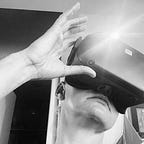Want Fairer Employee Evaluations? Use VR
Several years ago, when I was a staff writer at Billboard, a new editor came in and for some reason decided he disliked me. He assigned stories in my subject area to other writers without checking with me, once asked me if I was dating a member of a band whose story I was pitching (for the record: no, I just liked their album), and just generally treated me poorly. Frustrated, I took him to lunch and point blank asked how he thought I could do my job better. His (useless) answer: “be less rockist.” Dutifully, I spent the following week loudly raving about Lady Gaga, but still nothing. And he wasn’t as bad as another boss I had, one prone to screaming fits in the newsroom and throwing phones, who once told me to “be nicer.”
We’ve all had bad bosses who gave us terrible feedback. Much of this feedback is gendered and racialized — white men are praised for being aggressive, while women and BIPOC folks are penalized. And unless a situation has escalated to the point where HR needs to be present for evaluations, they are done with little oversight. But they of course make a big difference — who gets noticed, who gets promoted, who gets a pay raise. Getting in a boss’s good graces on the ground floor can have career-long repercussions.
In most white-collar job evaluations, your actual performance is only part of what you are evaluated on. At Billboard, I turned in clean copy and always met my deadlines. I broke stories, had good relationships with my sources, knew how to conduct a good interview and which artists were poised to break out next. But because of whatever intangible reasons the people above me had, it wasn’t good enough. Later I had a job where I asked someone for feedback, and he told me I had gotten off to a “rough start” but had improved. When I asked for clarification, I was told that the way I dressed (simple black dresses, by the way; it wasn’t like I was kitted out like a crust punk) was “off putting” to a khaki clad crowd.
These might all sound like small things, but taken in totality, they offer a pretty good picture of why many workplaces are far less diverse than they should be. If you penalize an otherwise talented employee because they prefer Ann Demeulemeester to Ann Taylor, or because their personal music taste doesn’t line up with yours, or because they rub you the wrong way, then they’re likely to leave, or at very least stop giving their best. In many cases they’ll go to your competitors, and pretty soon you’ll be falling behind.
Until now, there weren’t many ways to test whether a manager was giving good feedback to employees short of watching them, and that is time consuming and will be harder to do as remote work becomes more normalized. But virtual reality can give people a way to test whether a manager knows how to deliver useful feedback, and based on the responses they select, can determine unconscious biases.
Let’s say a manager puts on a headset and is given some basic background information. The employee they are about to evaluate is hard-charging and gets things done, has high standards for their direct reports, and can occasionally rub people the wrong way. The scenario starts, and the manager is randomly sitting across from either a white man or a Black woman. They can pick from different options the feedback they want to give, and simulate a conversation with realistic responses based on their comments. At the end, their manager can evaluate who gave fair feedback and expose biases. The idea is not to be punitive, but to let people identify and remedy their blind spots.
There is already a large body of research that shows VR works well for training. A piece we built for child welfare workers to practice conversations with families in crisis resulted in a 31% decrease in employee turnover in one state, saving millions of dollars; in another state, it reduced training costs by 75%. VR allows nuance that flat video doesn’t, and lets users feel like they are actually in a situation, as opposed to just looking at a screen.
In a recent survey by Emtrain, less than 20% of employees stated that they believe their managers have been trained to evaluate their performance. This won’t work anymore, especially as the hiring market heats up post pandemic. Investing in VR training to correct this now will pay massive dividends in the future.
